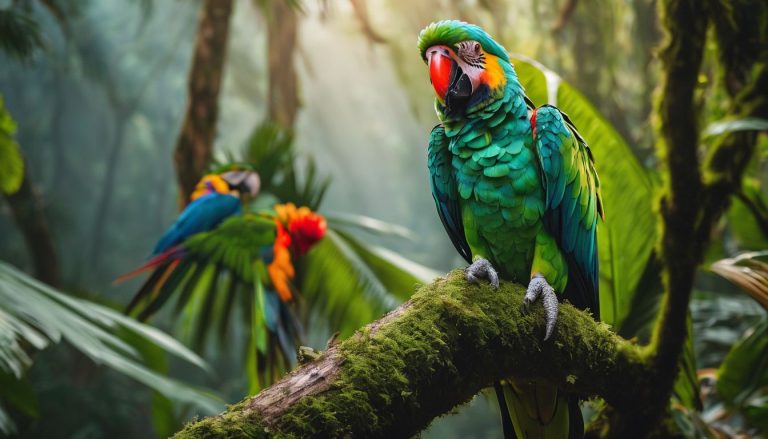Are you curious if your love for blueberries is something you can share with your feathered friends? It’s a question many bird lovers find themselves pondering as they look to enrich their pets’ or backyard visitors’ diets.
After diving into research, I am excited to share that blueberries, brimming with antioxidants and essential minerals like manganese and potassium, are indeed a fantastic fruit choice for birds.
In this blog post, we will explore which birds particularly enjoy these juicy berries, how to feed them safely, and other fruity options that make perfect additions to a bird-friendly menu.
Let’s embark on this journey together and transform our gardens into a delightful haven for birds!
Key Takeaways
- Birds enjoy eating blueberries because they are full of vitamins and antioxidants that help keep them healthy.
- Not all birds like berries; for example, woodpeckers prefer insects, while sparrows choose seeds over fruits.
- You can feed birds fresh or frozen blueberries in a shallow dish or feeder to attract various bird species to your yard.
- Protecting blueberry bushes with netting or scare tactics ensures both you and the birds can enjoy these nutritious fruits.
- Other safe fruit options for birds include apples, oranges, bananas, grapes, cherries, peaches, and pears.
Understanding Birds’ Diet
Birds have a diverse diet that includes insects, seeds, and fruits. Fruit provides essential vitamins and nutrients for birds’ overall health and well-being.
https://www.youtube.com/watch?v=mwURoy2UyA8
Types of food birds eat
Birds have a wide range of foods they enjoy. Seeds, insects, nectar, and fruits like blueberries are all on their menu. This variety helps them get the nutrients they need for energy and health.
For instance, seeds give them fat and protein, while fruits provide essential vitamins.
Feeding birds fruit is something I take joy in. Fresh blueberries are a favorite among my feathered friends because of their high mineral content. They’re not only delicious but also packed with antioxidants that support bird health.
Including safe fruits like strawberries, raspberries, and grapes in their diet can make mealtime exciting for them. Plus, offering these treats can bring more birds into my garden to watch and enjoy.
Benefits of fruit in birds’ diet
Fruit is crucial for birds’ health and provides essential vitamins and minerals. Blueberries, in particular, are rich in nutrients like manganese and potassium, which help support a bird’s overall well-being.
Additionally, the antioxidants found in blueberries can contribute to maintaining the health of our feathered friends. Incorporating a variety of fruits such as blueberries, strawberries, and blackberries into a bird’s diet can ensure they receive a diverse range of nutrients necessary for their vitality.
Attracting wild birds to your surroundings by offering them fruit not only aids their nutrition but also creates an enriching environment. Providing fresh fruits like blueberries encourages natural foraging behavior among birds while contributing to the beauty of your garden or yard.
Blueberries: A Healthy Choice for Birds
Blueberries provide essential vitamins and antioxidants for birds’ health. Many bird species, such as robins and thrushes, enjoy snacking on juicy blueberries.
Nutritional value of blueberries for birds
Blueberries are rich in essential minerals like manganese and potassium, providing birds with important nutrients. These antioxidants can benefit the overall health of our feathered friends, making blueberries a nutritious snack choice for them.
Additionally, planting blueberry bushes can attract more wild birds to your yard as they are known to enjoy feeding on these berries along with other fruits like strawberries and blackberries.
Birds can eat various types of fruits including grapes, apples, bananas, cherries, peaches, pears, oranges and watermelon.
Birds that love blueberries
Blueberries are a favorite of many bird species for their sweet taste and high nutritional value. Here’s a list of bird species that love blueberries:
- Robins: These birds are known for their fondness for berries, especially blueberries, and will readily visit gardens and yards with berry-producing plants.
- Thrushes: Birds like the Eastern Bluebird and Swainson’s Thrush enjoy feasting on blueberries, making them regular visitors to areas where these fruits grow.
- Mockingbirds: Known for their diverse diet, these vocal birds eagerly consume ripe blueberries as part of their food source.
- Cedar Waxwings: These sleek, crested birds are particularly attracted to fruit-bearing trees and shrubs, including those with juicy blueberries.
- Warblers: Many warbler species feed on fruit during migration, and ripe blueberries are among their preferred choices.
- Nutritional value of blueberries for birds
Birds that do not prefer berries
Some birds do not prefer berries due to their naturally varied diets.
- Woodpeckers: These birds primarily feed on insects found in tree bark or fruits with harder seed covers.
- Insectivorous Birds: Birds like warblers and flycatchers are primarily insect-eaters and may not show interest in berries.
- Seed-Eating Birds: Sparrows, finches, and grosbeaks favor seeds over fruits, making them less likely to consume berries.
- Carnivorous Birds: Raptors such as hawks and eagles have a diet consisting mainly of small mammals and other birds, so they typically do not consume berries.
How to Feed Blueberries to Birds
Gently place blueberries in a shallow dish or feeder. Ensure the berries are fresh and clean before offering them to your feathered friends.
Best ways to serve blueberries
Blueberries can be served to birds by placing them in a shallow dish or feeder.
- Gently wash the blueberries to remove any residue or pesticides.
- Place the washed blueberries in a shallow dish, bird feeder, or scatter them on the ground for ground-feeding birds.
- Ensure that the blueberries are fresh and not overripe to attract birds effectively.
- Consider planting blueberry bushes in your yard to provide a natural and fresh food source for birds.
- Keep the blueberries protected from predators such as squirrels and raccoons by using mesh netting or covers for bushes and plants.
- Provide a consistent supply of fresh blueberries to attract a variety of bird species to your garden or feeding area.
- Always ensure that the blueberries are free from any mold before offering them to birds, as moldy fruit can be harmful to their health.
- Check for fallen or spoiled berries regularly and remove them from the feeding area promptly.
How many blueberries to feed
Birds can enjoy 1-2 blueberries at a time. Moderation is key to ensure they can comfortably consume the fruit, benefiting from its nutrients without overeating. Providing small quantities several times throughout the day is best to accommodate their feeding habits and prevent wastage.
Remember, fresh blueberries are packed with essential minerals and antioxidants that contribute to the overall health of our feathered friends.
Protection methods for blueberries
To protect your blueberries and ensure they are safe for birds, it’s important to follow these guidelines:
- Place bird netting over the blueberry bushes to prevent birds from accessing the fruit.
- Use scare tactics like reflective tape or hanging aluminum pie plates to deter birds from landing on the bushes.
- Install motion – activated sprinklers to startle birds and keep them away from the blueberries.
- Prune your blueberry bushes to create dense foliage, making it harder for birds to reach the fruit.
- Consider planting thorny plants around your blueberry bushes as a natural deterrent for birds.
- Harvest ripe blueberries promptly to minimize the attraction for hungry birds.
- Create alternative feeding stations with bird – friendly fruits, diverting their attention away from the blueberries.
- Use physical barriers such as cloth bags or plastic containers to cover clusters of ripening blueberries until they are ready for harvest.
- Implement bird – repellent sound devices near the bushes to discourage birds from approaching.
Conclusion and Additional Tips
Discover the joy of providing fresh, pesticide-free blueberries to your feathered friends and learn about other bird-friendly fruit options. Keep exploring for more fascinating insights on feeding birds!
Recap of key points
Birds enjoy a variety of fruits, including blueberries, strawberries, and blackberries. It’s crucial to feed them fresh fruit free from pesticides to ensure their health and safety.
Blueberries are packed with essential nutrients like manganese and potassium, making them a healthy addition to a bird’s diet.
Protecting blueberries is important as many wild birds are attracted to berries. Planting blueberry bushes can help attract more feathered friends to your yard whilst providing them with essential nutrients.
FAQs
Q: What are the best ways to serve blueberries to birds?
Other fruit options for birds.
When considering other fruit options for birds, it’s important to choose varieties that are safe and provide essential nutrients. Some additional fruit choices suitable for birds include:
- Apples: Provide a good source of fiber and Vitamin C for birds.
- Oranges: Offer a refreshing source of hydration and Vitamin C.
- Bananas: Rich in potassium and easy for birds to eat.
- Grapes: A favorite among many bird species, providing hydration and natural sugars.
- Cherries: Offer a tasty treat with antioxidants and essential vitamins.
- Peaches: Provide a juicy snack with Vitamin A and fiber.
- Pears: A great source of hydration and dietary fiber for birds.
I’m Owen Featherstone, your bird-watching buddy and enthusiast of all things feathered! Armed with binoculars and a notebook, I’m on a never-ending quest to uncover the mysteries of our avian friends. Whether it’s deciphering melodies in a dawn chorus or finding out if hummingbirds ever take coffee breaks, I’m here to share the delightful world of birds with you. So grab your virtual wings, and let’s explore the skies together!







